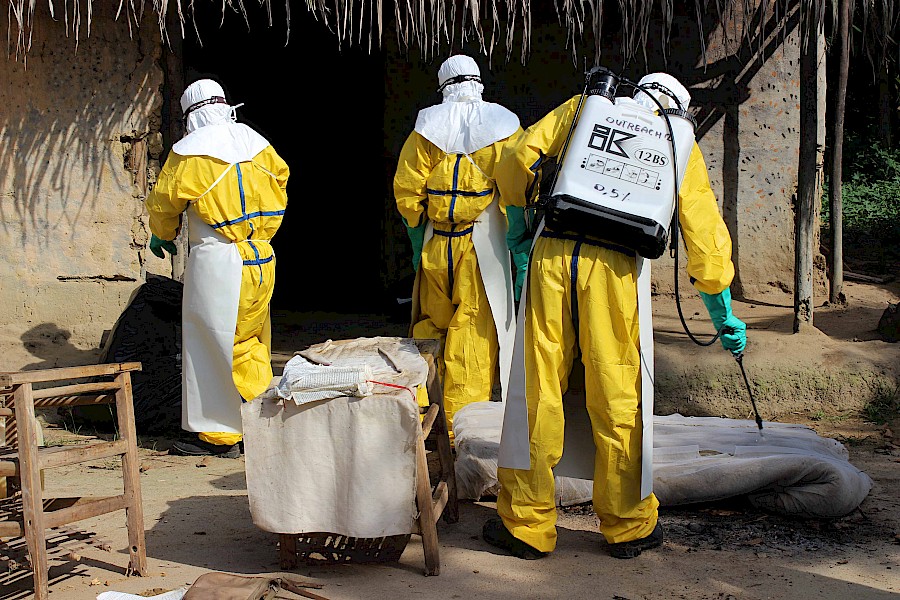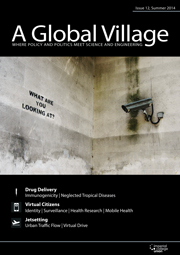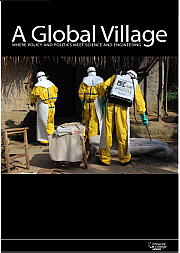Events
Impact
Policy, Politics and Science Conference
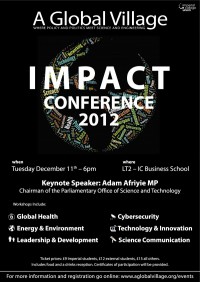
When?
Tuesday, December 11th 2012 6-10pm
Where?
Lecture Theatre 2, Imperial College Business School
SAF Building, South Kensington Campus
What?
This event is the first of its kind to be hosted by A Global Village and will be introduced by our keynote speaker MP Adam Afriyie followed by multiple participatory workshops on topics ranging from global health, poverty and the environment to innovative technology for development, cyber-security and nuclear disarmament.
Registration?
The ticket price is £9 for Imperial students, £12 external students and £15 for all others and includes food and a drinks reception. Certificates of participation will be provided.
Register here.
| Programme? | |
| 6.00-6.30 | Keynote speaker Adam Afriyie MP (LT2 Business School) |
| 6.30-6.40 | Workshop introduction and overview (LT2 Business School) |
| 6.40-7.00 | Registration (SAF Level 1 Concourse) |
| 7.00-7.45 | Workshop Session 1 (SAF Rooms 119-121) |
| 7.50-8.35 | Workshop Session 2 |
| 8.40-9.25 | Workshop Session 3 |
| 9.30-10.15 | Drinks (SAF Level 1 Concourse) |
Keynote
Adam Afriyie MP
Science and Policy: Threats and Opportunities
Science and innovation have transformed our lives at breathtaking speed. They are vital to our country’s future. How can Government embrace the opportunities offered by science and innovation to improve the lives of all?
Adam Afriyie MP was Shadow Minister for Science and Innovation from 2007 to 2010. He is Chair of the Parliamentary Office of Science & Technology (POST), Chair of the Parliamentary Space Committee APG, President of the Conservative Technology Forum and Founder of Conservative Friends of Science. Prior to becoming an MP in 2005, Adam was a successful entrepreneur in the information services and technology sector.
Workshops
A Tea Party Guide to Climate Change [Session 1]
Prof. David Fisk, Director of the Laing O'Rourke Centre for Systems Engineering and Innovation
This workshop will explore where we stand on current climate change negotiations and the actions to be implemented beyond the existing UN Treaty system to find viable solutions for the future.
Prof. David Fisk was Chief Scientist and Policy Director in the Department of the Environment and led the UK climate change negotiating team from 1992 – 1998. He joined Imperial College as BP/Royal Academy of Engineering Professor in Engineering for Sustainable Development in the Civil and Environmental Engineering Department in 2002, where he became the Director of the Laing O'Rourke Centre for Systems Engineering and Innovation in 2010.
Science and Politics - Together or Apart? [Session 1]
Ehsan Masood, Editor of Research Fortnight and Research Europe
Should scientists be completely independent on policy making? Who makes decisions about scientific research? Where should be the balance? These and other problematic issues which bind science and society will be discussed with Ehsan Masood.
Ehsan Masood is editor of Research Fortnight and author of several books such as “Dry: Life without Water” (Harvard, 2006), and “Science and Islam, a History” (Icon, 2009). He has also written The Guardian, The Economist, New Scientist and Nature, for which he has worked for many years as writer and editor. He frequently comments on BBC Radio 4 and is a trustee of the not-profit leadership-training organisation Leadership for Environment and Development.
The Neglected Tropical Diseases [Session 1]
Dr. Anna Phillips, West Africa (and Mozambique) Programme Manager at Schistosomiasis Control Initiative
Earlier this year leaders from 13 pharmaceutical companies, governments of the United States and the United Kingdom, the Bill & Melinda Gates Foundation, the World Bank and other global health organizations gathered at the “London declaration’ on Neglected Tropical Diseases (NTDs) to announce their support for eliminating 10 NTDs by 2020. NTDs are now on the international agenda. In the largest coordinated effort to date, the group announced that they will provide hundreds of millions of dollars to strengthen both research and implementation programs. This workshop provides a background to NTDs and highlights the successes achieved to-date by the SCI in assisting the scale-up of feasible, visibly powerful and cost-effective control programs.
Dr. Anna Phillips joined the Schistosomiasis Control Initiative (SCI) in February 2009 as a programme manager of the USAID integrated NTD control program in Burkina Faso and Niger, in Francophone West Africa following the completion of her PhD at Imperial College. She now manages the DFID funded schistosomiasis control programs in Niger and Cote D'Ivoire. In 2010 Anna was awarded two large-scale schistosomiasis research (SCORE) projects in Mozambique and Niger.
How Do We Make Practical Affordable Innovations Happen on the Ground in Global Health? [Session 2]
Sir Tom Hughes-Hallett, Executive Chair of Imperial College's Institute of Global Health Innovation
This interactive workshop will discuss the void between academic research in global health and the identification of real problems on the ground in global health, looking at how innovative solutions can be developed and implemented at scale. Workshop participants will be directly consulted on the formation of a new initiative by the IGHI aimed at enabling multidisciplinary groups of students to undertake high-impact projects in global health.
Sir Tom Hughes-Hallett is the newly appointed Chairman of the Institute for Global Health Innovation at Imperial College. A self-described reformed banker, Sir Hughes-Hallett was formerly Chief Executive of Marie Curie Cancer Care and has a particular interest in palliative care.
Cyber-Security [Session 2]
Jay Abbott, Founder & Managing Directorat Advanced Security Consulting
Jay Abbott is Founder and Managing Director at Advanced Security Consulting, Chair of the Competitions Board at Cyber Security Challenge UK and former Director of the Threat and Vulnerability Practice at PricewaterhouseCoopers.
PLAYshop INTERCHANGE: Play | Pause | Proceed to Lead [Session 2]
William Wong, Chief Executive at 3become1
What does play have to do with a WORKshop, or leadership? With a few favourite theatre rehearsal warm-ups (not rigorous workout), we will INTERact in fun ways, meet new friends and colleagues in areas of shared interests. What happens next is up to YOU.
William Wong is passionate for INTER-everything: intercultural, interdisciplinary, interfaith, intergenerational, international and of course the Internet. He has been a management consultant, theatre director, cultural strategist and now works as a social entrepreneur connecting creativity and play with wealth creation and social wellbeing. William has been a proactive Alumni Advisory Board Member at Imperial College Business School since 2009.
Mental Health and the Military [Session 3]
Dr. Richard Pinder, Honorary Clinical Research Fellow at School of Public Health, Imperial College London
This workshop will involve an introduction to epidemiological methods with the example of researching mental health among military populations. The workshop will consider the political and social translation of this type of research, with particular emphasis being given to the impact of this research on policy. Interactive group work will include developing methodologies to research the health of veterans and their families.
Dr. Richard Pinder is an NIHR academic clinical fellow in the School of Public Health at Imperial College London and has worked with the Dr Foster Unit evaluating healthcare performance. At present he is a registrar in public health medicine in the NHS and at the Health Protection Agency. His research interests include health care management, health policy and mental health.
Catalysing Extreme Poverty's End Within a Generation [Session 3]
Stephanie Talbut, Global Poverty Project
Join this workshop showcasing the live 1.4 Billion Reasons multi-media presentation from the Global Poverty Project, discussing how the momentum of current and past initiatives can be strengthened to achieve the Millennium Development Goals and reframe the media debate on poverty. The Global Poverty Project campaigns for government, business and consumer action that will create important systemic change whilst building a movement that empowers individuals to take simple effective actions aimed at ending extreme poverty.
Stephanie Talbut is an experienced researcher and has presented globally, including at the International Studies Association in New York. Her specialisms are security, international relations theory and development. She was the Campaigns Assistant for the 2012 Live Below the Line campaign and now works on the Global Poverty Project Ambassadors team. She holds a PhD in International Relations Theory.
Conflict Resolution in the 21st Century [Session 3]
Sharon al-Soodani, OneVoice Movement
This workshop aims to provide insights into general conflict understanding and conflict resolution, and the application of these principles to the Israeli-Palestinian conflict. An interactive session will focus upon technological advancements in security and social networking, and how these could be used to advance the peace process.
Sharon al-Soodani has an MA from Cambridge University in Theology and Religious Studies, specialising in Islam and Biblical Studies. She has previously been employed as PA to the British Defence Attaché in Jordan and has worked with Foundation for Relief and Reconciliation in the Middle East before taking up her role as Outreach and Education Director at the OneVoice Movement. The OneVoice Movement is an international mainstream grassroots movement that aims to amplify the voice of Israeli and Palestinian moderates, empowering them to seize back the agenda for conflict resolution and demand that their leaders achieve a two-state solution.
Supported by O2 Think Big.
From Bombs to Bots
Security in the Cyber Sphere
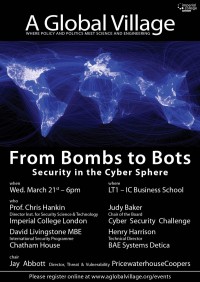
Who controls your data? How did they get it? And what might they do with it?
What if the internet went down? Or traffic lights stopped working? Is critical national infrastructure vulnerable to infiltration?
Who should police the cyber sphere? And how?
When?
Wednesday, March 21st 2012 at 6pm
Where?
Imperial College Business School
Lecture Theatre 1 (LT1)
South Kensington Campus
What?
An important and growing issue, cyber-crime and attack represents a threat in many varied guises not least due to the increasing dependence of national infrastructure on ICT.
Who?
Prof. Chris Hankin
Director, Institute for Security Science & Technology, Imperial College London
Prof. Chris Hankin is Director of the Institute for Security Science and Technology and a Professor of Computing Science. He was Deputy Principal of the Faculty of Engineering from September 2006 until October 2008, and Pro Rector (Research) from June 2004 until September 2006. He is a Head of the Theory Section in the Department of Computing, and his research is in semantics-based program analysis and language-based computer security.
Judy Baker
Chair of the Board, Cyber Security Challenge UK
Judy Baker is Director of the Cyber Security Challenge UK designed to attract more highly talented people to a career in cyber security. Prior to this she worked within the UK Government to help protect Critical National Infrastructure. She established the Government's first Critical Infrastructure Protection (CIP) department and spent 9 years developing CIP policies and information exchange.
David Livingstone MBE
International Security Programme, Chatham House
David Livingstone MBE DSC is an Associate Fellow on the International Security Programme at Chatham House and the Managing Director of Napier Meridian. His company, established in 2005, provides expertise on business transformation in the national security and resilience domain, with a particular focus on the cyber domain. He was a founder member of the Cabinet Office’s first official committee addressing the electronic threats to the Critical National Infrastructure.
Henry Harrison
Technical Director, BAE Systems Detica
Henry Harrison is the Technical Director at BAE Systems Detica. His current focus is cyber security, where he is leading the development of new security technologies, and speaks for Detica on cyber security matters. He has spent his working career with organisations innovating the digital platform – from communications equipment manufacturers to telecoms operators and software vendors. Previously, he ran his own start-up developing a digital collaboration environment.
Chair?
Jay Abbott
Director, Threat & Vulnerability Practice, PricewaterhouseCoopers
Nation Building
The Role of the West in African Health, Development and Governance
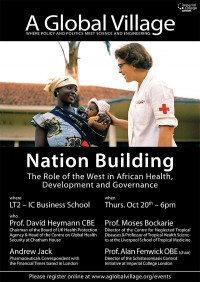
When?
Thursday, October 20th 2011 at 6pm
Where?
Imperial College Business School
Lecture Theatre 2 (LT2)
South Kensington Campus
What?
This panel discussion will focus on the role of the developed world, including both governments and NGOs, in African health ranging from the building of primary healthcare systems to administering mass vaccination and treatment programmes and trauma care. Such intervention crosses into both development and governance, with issues surrounding foreign policy objectives and sovereignty, combined with persistent debate about the best approach to aid, posing some challenging questions in the health arena. Just when does helping amount to meddling?
Who?
Prof. David Heymann CBE is the Chairman of the Board of the UK Health Protection Agency (HPA) and is the Head of the Centre on Global Health Security at Chatham House. Prior to his appointment to the HPA in 2009, Dr. Heymann was the World Health Organization's (WHO) Assistant Director-General for Health Security and Environment. Before joining WHO, Dr. Heymann worked for 13 years as a medical epidemiologist in sub-Saharan Africa on assignment from the US Centers for Disease Control and Prevention (CDC).
Prof. Moses Bockarie is the Director of the Centre for Neglected Tropical Diseases and Professor of Tropical Health Sciences at the Liverpool School of Tropical Medicine. Hailing originally from Sierra Leone, he has worked there as a medical entomologist before moving to the Papua New Guinea Institute of Medical Research and then joining the Center for Global Health and Diseases at Case Western University. He is a member of the WHO panel of Experts on parasitic infections.
Andrew Jack is Pharmaceuticals Correspondent with the Financial Times, based in London. He joined the newspaper in 1990, and has worked as a correspondent in London, Paris and Moscow. Since 2005, he has covered pharmaceuticals and healthcare. Prior to joining the FT, has worked for the New York City Government and as a freelance consultant and writer.
Chair?
Prof. Alan Fenwick OBE is Director of the Schistosomiasis Control Initiative (SCI) and Professor of Tropical Parasitology at the School of Public Health, Imperial College London. Prof. Fenwick has spent 36 years in Africa working on the research and control of schistosomiasis and other intestinal helminths including 17 years in Sudan where he was a Founder of the Blue Nile Health Project, and 14 years in Egypt where he led the $36 million Schistosomiasis Research Project. He was awarded an OBE in 1988 for his work in Burkina Faso.
Big Pharma and Global Health
The Role of Intellectual Property
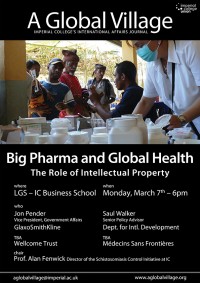
When?
Monday, March 7th 2011 at 6pm
Where?
Imperial College Business School
Lower Ground Square Lecture Theatre (LGS)
South Kensington Campus
What?
A Global Village will host a panel discussion to address the issues surrounding the role of intellectual property rights and the pharmaceutical industry in global health. Does the protection of intellectual property rights in developing countries hinder the improvement of public health? Is the patent system unsuited to the field of public health? Is the UNITAID Medicines patent pool a feasible solution to the access to medicines problem, what are the alternatives?
Who?
Jon Pender, Vice President Governmental Affairs at GlaxoSmithKline
Saul Walker, Senior Policy Advisor at Department for International Development UK
Diarmaid McDonald, StopAIDS Coordinator, UK Consortium on AIDS & Intl. Development
Dr. Adrian Hopkins, Director of the Mectizan Donation Program
Chair?
Prof. Alan Fenwick OBE, Director Schistosomiasis Control Initiative at IC London
Is The Future Nuclear?

Panel discussion chaired by Neil Hirst, with Prof. Jim Skea OBE, Prof Gordon MacKerron and Prof. James Marrow
When?
Thursday, Feb 17th 2011 at 6pm
Where?
Imperial College Business School
Lower Ground Square Lecture Theatre (LGS)
What?
A Global Village will host a panel discussion addressing the question 'Is the Future Nuclear?'. The panel will be composed of Prof. Jim Skea OBE, Director of the UK Energy Research Centre, Prof Gordon MacKerron, Director of the Sussex Energy Group and Chair of the UK Committee on Radioactive Waste Management, and Prof. James Marrow, Co-director of the Programme in Nuclear & Energy Materials, Oxford Martin School, University of Oxford. The event will be chaired by Neil Hirst, Senior Policy Fellow in Energy Mitigation and Climate Change at the Grantham Institute at Imperial College. The panel discussion will specifically focus on the potential for nuclear power to play an increased role in an emerging global low carbon economy.
Global Food Crisis
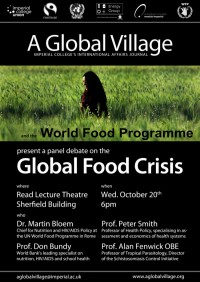
Panel discussion chaired by Prof. Alan Fenwick OBE, with Dr. Martin Bloem, Prof. Don Bundy and Prof. Peter Smith
When?
Wednesday, Oct 20th 2010 from 6pm to 8pm
Where?
Read Lecture Theatre, Sherfield Building level 5, Imperial College
What?
A Global Village and the World Food Programme will host a panel discussion on the Global Food Crisis chaired by Prof. Alan Fenwick OBE. The panel will be composed of Prof. Peter Smith from Imperial College with Dr. Martin Bloem, Chief for Nutrition and HIV/AIDS Policy at the UN World Food Programme in Rome and Prof. Don Bundy, the World Bank's leading specialist on school health, nutrition, HIV/AIDS and education. The panel discussion will specifically focus on the role of the scientific community and international organisations such as WFP in tackling global food shortages particularly in areas such as nutrition and catering for the millions affected by chronic disease.
